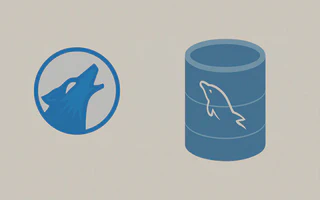Amarok MySQL

In Linux, my favorite music player is MPD for its simplicity, for running as a daemon, and for
allowing me to choose between various GUI options (or none), but sometimes I miss some features,
such as play count, playlist generators, fetching covers, integration with Last.fm and Wikipedia,
artist “Various,” among many other functions.
The feature-rich player for Linux is probably Amarok.
Usually, I don’t install Amarok as my default player because it is heavy, consumes a lot of memory, and depends on some QT libraries. But even so, at some point, I abandon my principles of simplicity and install the wolf player (to go back to using MPD later…)
By default, Amarok uses an SQLite database, which is sufficient for those who only use one computer
and have few songs. That’s not my case (my music folder is close to 600GB).
For people with large libraries like mine, using MySQL can significantly improve performance. I will
try to detail the installation in the following lines.
Install Amarok2 and MySQL:
sudo pacman -S amarok mysql
Configure MySQL and add mysqld to the rc.conf daemons
Create the amarokdb database, create the amarok user, and set a password:
sudo mysql -p -u root
CREATE DATABASE amarokdb;
USE amarokdb;
GRANT ALL ON amarokdb.* TO amarok@'%' IDENTIFIED BY 'sua_senha';
FLUSH PRIVILEGES;
quit
With this configuration, I can share the database with other machines. To allow only local access, change the fourth line to:
GRANT ALL ON amarokdb.* TO amarok@localhost IDENTIFIED BY 'your_password';
Open Amarok, go to Setings… » Configure Amarok » Database, and check
Use external MySQL database. Fill in the information and restart the program.
Explore the thousands of features.
After setting up and updating the library, I use a plugin that synchronizes my playcount with
Last.fm’s. The plugin is called Klastfm and can be found
here.
It has been a year since the developer last updated the script, so I had to manually fix some errors.
First, install Ruby 1.8.7 and rubygems-1.8:
Install the following Ruby packages:
sudo gem-1.8 install activerecord mysql httparty progressbar ya2yaml —no-rdoc —no-ri
Comment out line #27 in the klastfm.rb file:
line 27: #ActiveRecord::Base.logger = Logger.new('log/database.log')
On line 93, change
@lastfm.tracks_in_week(week['from'], week['to']).each do |track|
to
[*@lastfm.tracks_in_week(week['from'], week['to'])].each do |track|
Copy the file /config/config.yaml.example to /config/config.yaml and add your Last.fm API, which
can be found at http://www.last.fm/api/account.
ruby-1.8 klastfm.rb runs the program. It will download all your scrobbles from Last.fm and merge
them with the Amarok database. This process takes a while, but it’s worth it.
creating a statistic entry for every track
creating stat: 100% |ooooooooooooooooooooooooooooooooooooooooooooooooooooooooooooooooooooooooooooooooooooooooooooooooooooooooooooooooooooooooo| Time: 00:00:57
getting all tracks you ever submitted to last.fm (ca. 15050)
get playcount: 100% |ooooooooooooooooooooooooooooooooooooooooooooooooooooooooooooooooooooooooooooooooooooooooooooooooooooooooooooooooooooooooo| Time: 01:05:29
getting all tracks played in the last 163 weeks
klastfm.rb:93:in `date_tracks': undefined method `each' for nil:NilClass (NoMethodError)oooooooooooooooooooooooooooooooooooooooooooo | ETA: 00:01:55
from klastfm.rb:91:in `each'
from klastfm.rb:91:in `date_tracks'
from klastfm.rb:144
Keeping the database synchronized is beneficial as it makes generating playlists easier, for example.